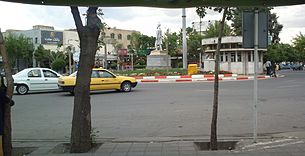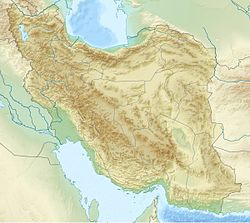Salmas
| Salmas | |
|---|---|
| City | |
| City of Salmas | |

Islamic Revolution Circle
|
|
| Nickname(s): Shahpur | |
| Coordinates: 38°11′41″N 44°45′53″E / 38.19472°N 44.76472°E | |
| Country |
|
| Province | West Azerbaijan |
| County | Salmas |
| District | Central |
| Rebuilt | 1930 |
| Government | |
| • Type | Mayor–Council |
| • Body | Salmas |
| • Mayor | N/A |
| Area | |
| • Total | 9.26 sq mi (24.0 km2) |
| • Land | 9.26 sq mi (24.0 km2) |
| • Water | 0 sq mi (0 km2) |
| • Metro | 4.75 sq mi (12.3 km2) |
| Elevation | 4,532 ft (1,381 m) |
| Population (2011) | |
| • Total | 97,060 |
| • Rank | 89th, Iran |
| • Density | 10,000/sq mi (4,000/km2) |
| Demonym(s) | Salmasian |
| Time zone | IRST (UTC+3:30) |
| • Summer (DST) | IRDT (UTC+4:30) |
| ZIP code | 58811 ≤ 58XXX ≤ 58991 |
| Area code(s) | 44 |
Salmas (Persian: سلماس, Azerbaijani: Sālmās; also Romanized as Salmās and Salamas) is a city in West Azerbaijan Province, Iran. It is located near the eastern boarder of Turkey. At the 2011 census, its population was 97,060. The majority of the population is composed of Azerbaijanis and Kurds (mostly at the countrysides) with some Assyrian, Armenian, Persian Jewish, and Persians as minorities.
Early mention of Salmas was made in 1281, when its Assyrian bishop made the trip to the consecration of the Assyrian Church of the East patriarch Yaballaha in Baghdad.
In the Battle of Salmas on 17–18 September 1429, the Kara Koyunlu were defeated by Shah Rukh who was consolidating Timurid holdings west of Lake Urmia. However, the area was retaken by the Kara Koyunlu in 1447 after the death of Shah Rukh.
Mar Shimun, the Patriarch of the Assyrian Church of the East was murdered by the Kurdish chieftain Simko Shikak in Salmas in March 1918.
Around the advent of the 1910s, Imperial Russia started to station infantry and Cossacks in Salmas. The Russians retreated at the time of Enver Pasha's offensive in the Iran-Caucasus region, but returned in early 1916, and stayed up to the wake of the Russian Revolution. Part of the Assyrian Genocide took place in Salmas and the surrounding region at the hands of the Ottoman Army and loyal Kurdish irregulars. This followed initially successful Assyrian military campaigns against the Ottomans and their Kurdish allies.
...
Wikipedia

